what ind of加可数名词单数或不可数名词,what kinds of后加
- 格式:doc
- 大小:1.07 MB
- 文档页数:3
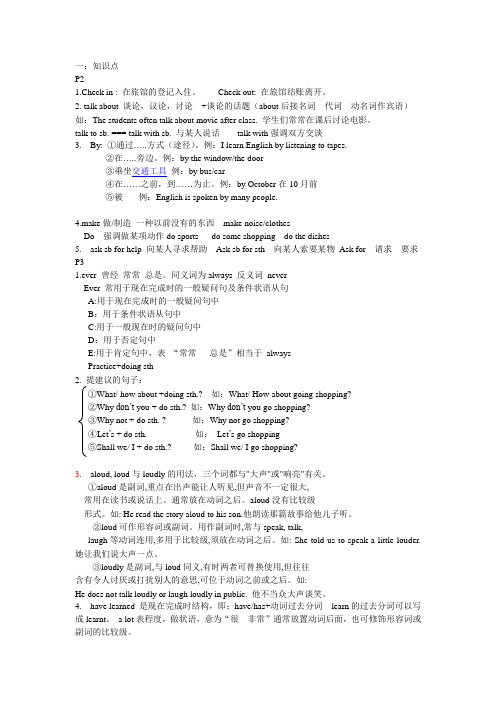
一:知识点P21.Check in : 在旅馆的登记入住。
Check out: 在旅馆结账离开。
2. talk about 谈论,议论,讨论+谈论的话题(about后接名词代词动名词作宾语)如:The students often talk about movie after class. 学生们常常在课后讨论电影。
talk to sb. === talk with sb. 与某人说话talk with强调双方交谈3. By: ①通过…..方式(途径)。
例:I learn English by listening to tapes.②在…..旁边。
例:by the window/the door③乘坐交通工具例:by bus/car④在……之前,到……为止。
例:by October在10月前⑤被例:English is spoken by many people.4.make做/制造一种以前没有的东西make noise/clothesDo 强调做某项动作do sports do some shopping do the dishes5. ask sb for help 向某人寻求帮助Ask sb for sth 向某人索要某物Ask for 请求要求P31.ever 曾经常常总是。
同义词为always 反义词neverEver 常用于现在完成时的一般疑问句及条件状语从句A:用于现在完成时的一般疑问句中B:用于条件状语从句中C:用于一般现在时的疑问句中D:用于否定句中E:用于肯定句中,表“常常总是”相当于alwaysPractice+doing sth2. 提建议的句子:①What/ how about +doing sth.? 如:What/ How about going shopping?②Why don’t you + do sth.? 如:Why don’t you go shopping?③Why not + do sth. ? 如:Why not go shopping?④Let’s + do sth. 如:Let’s go shopping⑤Shall we/ I + do sth.? 如:Shall we/ I go shopping?3. aloud, loud与loudly的用法,三个词都与"大声"或"响亮"有关。
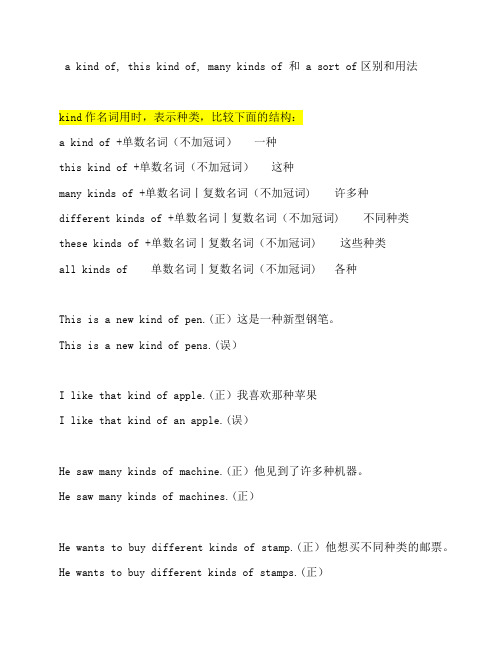
a kind of, this kind of, many kinds of 和 a sort of区别和用法kind作名词用时,表示种类,比较下面的结构:a kind of +单数名词(不加冠词)一种this kind of +单数名词(不加冠词)这种many kinds of +单数名词丨复数名词(不加冠词) 许多种different kinds of +单数名词丨复数名词(不加冠词) 不同种类these kinds of +单数名词丨复数名词(不加冠词) 这些种类all kinds of 单数名词丨复数名词(不加冠词) 各种This is a new kind of pen.(正)这是一种新型钢笔。
This is a new kind of pens.(误)I like that kind of apple.(正)我喜欢那种苹果I like that kind of an apple.(误)He saw many kinds of machine.(正)他见到了许多种机器。
He saw many kinds of machines.(正)He wants to buy different kinds of stamp.(正)他想买不同种类的邮票。
He wants to buy different kinds of stamps.(正)She lent me three kinds of book.(正)她借给我三种书。
She lent me three kinds of books.(正)He has read all kinds of story-book.(正)他读过各种各样的故事书。
He has read all kinds of story-books. 正)【比较】This kind of book is worth reading.这种书值得读。
(一种〉These kinds of books are worth reading.这些种类的书值得读。
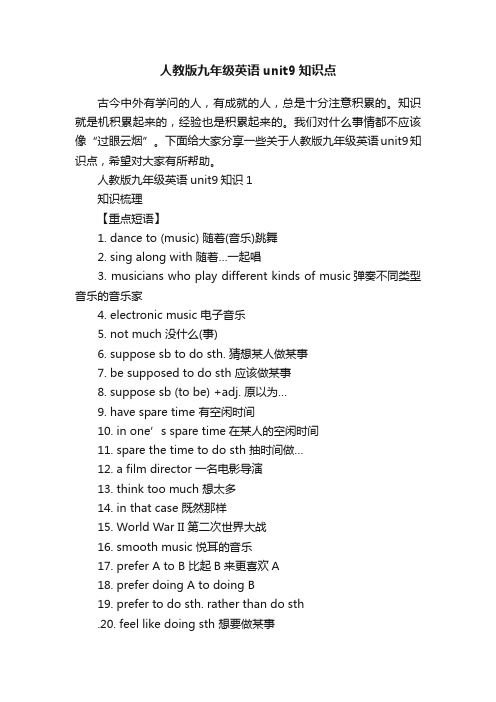
人教版九年级英语unit9知识点古今中外有学问的人,有成就的人,总是十分注意积累的。
知识就是机积累起来的,经验也是积累起来的。
我们对什么事情都不应该像“过眼云烟”。
下面给大家分享一些关于人教版九年级英语unit9知识点,希望对大家有所帮助。
人教版九年级英语unit9知识1知识梳理【重点短语】1. dance to (music) 随着(音乐)跳舞2. sing along with 随着…一起唱3. musicians who play different kinds of music弹奏不同类型音乐的音乐家4. electronic music 电子音乐5. not much 没什么(事)6. suppose sb to do sth. 猜想某人做某事7. be supposed to do sth 应该做某事8. suppose sb (to be) +adj. 原以为…9. have spare time 有空闲时间10. i n one’s spare time在某人的空闲时间11. spare the time to do sth 抽时间做…12. a film director 一名电影导演13. think too much 想太多14. in that case 既然那样15. World War II 第二次世界大战16. smooth music 悦耳的音乐17. prefer A to B 比起B来更喜欢A18. prefer doing A to doing B19. prefer to do sth. rather than do sth.20. feel like doing sth 想要做某事21. stick to 坚持,固守22. be down 悲哀,沮丧23. cheer sb up 使… 高兴/ 振奋24. have a happy ending 有个美满的结局25. try one’s best to do sth. 尽某人最大努力做…26. less serious 不那么严重27. a good way to do sth 做某事的好办法28. make me feel even sadder 让我感觉更伤心29. provide plenty of information about a certain subject提供了大量的关于某个主题的信息30. shut off my brain 关闭我的大脑【重点句型】1. I love singers who write their own music.我喜欢自己创作曲子的歌手。
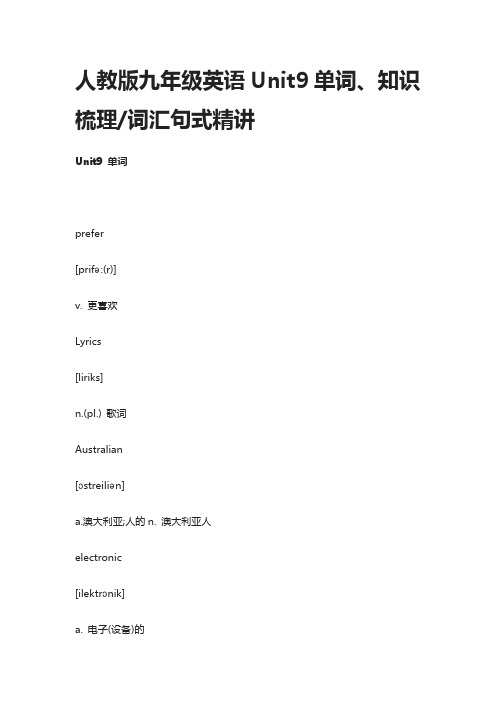
人教版九年级英语Unit9单词、知识梳理/词汇句式精讲Unit9 单词prefer[prifə:(r)]v. 更喜欢Lyrics[liriks]n.(pl.) 歌词Australian[ɔstreiliən]a.澳大利亚;人的n. 澳大利亚人electronic[ilektrɔnik]a. 电子(设备)的[səpəuz]v. 推断;料想smooth[smu:θ]adj. 平滑的;悦耳的spare[speə]adj. 空闲的;不用的case[keIs]n.情况;实情in that case既然那样;假使那样的话warn. 战争;战争状态director[direktə]n.导演;部门负责人dialogue[daiəlɔg ]n. (=dialog) 对话;对白documentary[dɔkjumentri]n.纪录片drama[dra:mə]n. 戏;剧plenty[plenti[ pron. 大量;众多plenty of大量;充足shut[ʃʌt]v. (shut; shut) 关闭;关上superhero[su:pə(r)hiərəu]n.超级英雄horror[hɔrə]n. 震惊;恐惧thriller[θril@(r)]n.惊险电影(小说、戏剧intelligent[intelIdʒənt]a.有才智的;聪明的sense[sens]v. 感觉到;意识到n. 感觉;意识pain[pein]n. 痛苦;苦恼reflect[riflekt]v. 反映;映出perform[pə(r)fɔ:(r)m]v. 表演;执行amazing[əmeiziŋ]a. 令人惊奇;喜的pity[piti]n. 遗憾;怜悯total[təutl]n. 总数;合计a. 总的;全体的in total总共;合计master[ma:stə]n.能手;主人v. 掌握praise[preiz]v. & n. 表扬;赞扬national[næʃnl]adj. 国家的;民族的recall[rikɔ:l]v. 回忆起;回想起wound[wu:nd]n. 伤;伤口;创伤World War II二战Titanic[taitænik]《泰坦尼克号》(电影名)Carmen[ka:(r)men]卡门(女名)Dan Dervish[dæn; də:(r)viʃ]丹•德维什Unit9 知识梳理【重点短语】1. dance to (music) 随着(音乐)跳舞2. sing along with 随着…一起唱3. musicians who play different kinds of music 弹奏不同类型音乐的音乐家4. electronic music 电子音乐5. not much 没什么(事)6. suppose sb to do sth. 猜想某人做某事7. be supposed to do sth 应该做某事8. suppose sb (to be) +adj. 原以为…9. have spare time 有空闲时间10. in one’s spare time在某人的空闲时间11. spare the time to do sth 抽时间做…12. a film director 一名电影导演13. think too much 想太多14. in that case 既然那样15. World War II 第二次世界大战16. smooth music 悦耳的音乐17. prefer A to B 比起B来更喜欢A18. prefer doing A to doing B19. prefer to do sth. rather than do sth.20. feel like doing sth 想要做某事21. stick to 坚持,固守22. be down 悲哀,沮丧23. cheer sb up 使…高兴/ 振奋24. have a happy ending 有个美满的结局25. try one’s best to do sth. 尽某人最大努力做…26. less serious 不那么严重27. a good way to do sth 做某事的好办法28. make me feel even sadder 让我感觉更伤心29. provide plenty of information about a certain subject 提供了大量的关于某个主题的信息30. shut off my brain 关闭我的大脑【重点句型】1. I love singers who write their own music.我喜欢自己创作曲子的歌手。
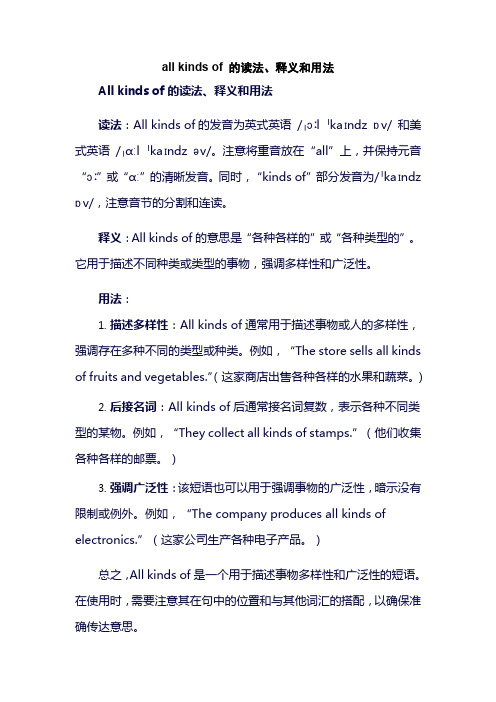
all kinds of 的读法、释义和用法
All kinds of的读法、释义和用法
读法:All kinds of的发音为英式英语/ˌɔːl ˈkaɪndz ɒv/ 和美式英语/ˌɑːl ˈkaɪndz əv/。
注意将重音放在“all”上,并保持元音“ɔː”或“ɑː”的清晰发音。
同时,“kinds of”部分发音为/ˈkaɪndz ɒv/,注意音节的分割和连读。
释义:All kinds of的意思是“各种各样的”或“各种类型的”。
它用于描述不同种类或类型的事物,强调多样性和广泛性。
用法:
1.描述多样性:All kinds of通常用于描述事物或人的多样性,强调存在多种不同的类型或种类。
例如,“The store sells all kinds of fruits and vegetables.”(这家商店出售各种各样的水果和蔬菜。
)
2.后接名词:All kinds of后通常接名词复数,表示各种不同类型的某物。
例如,“They collect all kinds of stamps.”(他们收集各种各样的邮票。
)
3.强调广泛性:该短语也可以用于强调事物的广泛性,暗示没有限制或例外。
例如,“The company produces all kinds of electronics.”(这家公司生产各种电子产品。
)
总之,All kinds of是一个用于描述事物多样性和广泛性的短语。
在使用时,需要注意其在句中的位置和与其他词汇的搭配,以确保准确传达意思。

精选八年级上册英语要点:kind of 与
kinds of的区别
kind of 与kinds of:
1kind of 单独用,表示“有点”,后接形容词或副词:
He is kind of thin.”他有点瘦” I feel kind of hungry.”我有点饿”
Uncle Wang speaks kind of quickly. 王叔叔说得有点快。
2若kind of前有a, this, that, what等,译为“种,种类” 后加名词。
That kind of question is difficult to answer. 那类问题难回答。
What kind of sport do you like best? 你最喜欢何种运动?
3熟记一些短语:all kinds of...“各种各样的...” many kinds of“很多种类的”
different kinds of“不同种类的” 后都加名词。
以上就是为大家整理的精选八年级上册英语要点:kind of 与kinds of的区别,怎么样,大家还满意吗?希望
对大家的学习有所帮助,同时也祝大家学习进步,考试顺利!
相关标签搜索:八年级期中复习。
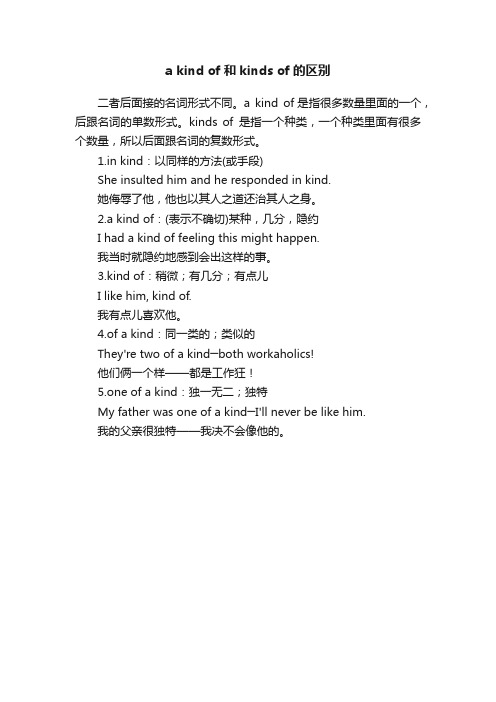
a kind of和kinds of的区别
二者后面接的名词形式不同。
a kind of是指很多数量里面的一个,后跟名词的单数形式。
kinds of是指一个种类,一个种类里面有很多个数量,所以后面跟名词的复数形式。
1.in kind:以同样的方法(或手段)
She insulted him and he responded in kind.
她侮辱了他,他也以其人之道还治其人之身。
2.a kind of:(表示不确切)某种,几分,隐约
I had a kind of feeling this might happen.
我当时就隐约地感到会出这样的事。
3.kind of:稍微;有几分;有点儿
I like him, kind of.
我有点儿喜欢他。
4.of a kind:同一类的;类似的
They're two of a kind─both workaholics!
他们俩一个样——都是工作狂!
5.one of a kind:独一无二;独特
My father was one of a kind─I'll never be like him.
我的父亲很独特——我决不会像他的。

kinds of后面加复数还是单数加复数。
例句:They sell all kinds of things.他们出售各种各样的东西。
kinds of和kind of的区别1、所接名词单复数不同:kinds of后面接不可数名词,或者可数名词的复数。
kind of后面接不可数名词,或者可数名词的单数。
kinds of和kind of的语法中心是kind或kinds,至于of,则引出不可数名词,可数名词的单数或复数,构成介词片语,做kind或kinds的后置修饰语。
2、语意不同:kind of是普通的副词,意思是有点儿,有一些。
举个例子就是he is kind of musician(他有点音乐家的气质)。
kinds of与名词连用,表示“各种各样的”或“各种类型的”,比如different kinds of diseases(不同种类的疾病)3、kind of可以表示“某人善良”:kind的单复数取决于其前面的单词而不是后面的名词,在非正式法中复数可数名词前可以用kinds of,但不能用kind of。
kind of往往在句中,表示某人善良。
如:it's very kind of you,而kinds of只有一种意思,表示“各种各样的。
”4、kind of表示的意思是“有点儿”kinds of表示很多种类,如:I have kind of all/different kinds of science books.我又所有/不同种类的科学书籍。
而kind of表示的意思是“有点儿”,如:I'm kind of tired.我有点儿累。
(kind of=sort of都是“有点儿”的意思)。
而且kind of还经常被写作kinda,广泛运用于口语当中表示“有一点儿”的意思。
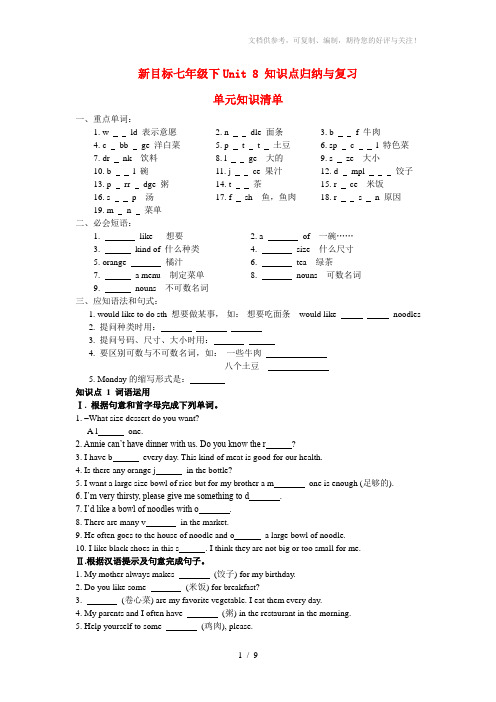
新目标七年级下Unit 8 知识点归纳与复习单元知识清单一、重点单词:1. w ld 表示意愿2. n dle 面条3. b f 牛肉4. c bb ge 洋白菜5. p t t 土豆6. sp c l 特色菜7. dr nk 饮料8. l ge 大的9. s ze 大小10. b l 碗11. j ce 果汁12. d mpl 饺子13. p rr dge 粥14. t 茶15. r ce 米饭16. s p 汤17. f sh 鱼,鱼肉18. r s n 原因19. m n 菜单二、必会短语:1. like 想要2. a of 一碗……3. kind of 什么种类4. size 什么尺寸5. orange 橘汁6. tea 绿茶7. a menu 制定菜单8. nouns 可数名词9. nouns 不可数名词三、应知语法和句式:1. would like to do sth 想要做某事,如:想要吃面条would like noodles2. 提问种类时用:3. 提问号码、尺寸、大小时用:4. 要区别可数与不可数名词,如:一些牛肉八个土豆5. Monday的缩写形式是:知识点1 词语运用Ⅰ. 根据句意和首字母完成下列单词。
1. –What size dessert do you want?-A l one.2. Annie can’t have dinner with us. Do you know the r?3. I have b every day. This kind of meat is good for our health.4. Is there any orange j in the bottle?5. I want a large size bowl of rice but for my brother a m one is enough (足够的).6. I’m very thirsty, please give me something to d.7. I’d like a bowl of noodles with o.8. There are many v in the market.9. He often goes to the house of noodle and o a large bowl of noodle.10. I like black shoes in this s . I think they are not big or too small for me.Ⅱ.根据汉语提示及句意完成句子。
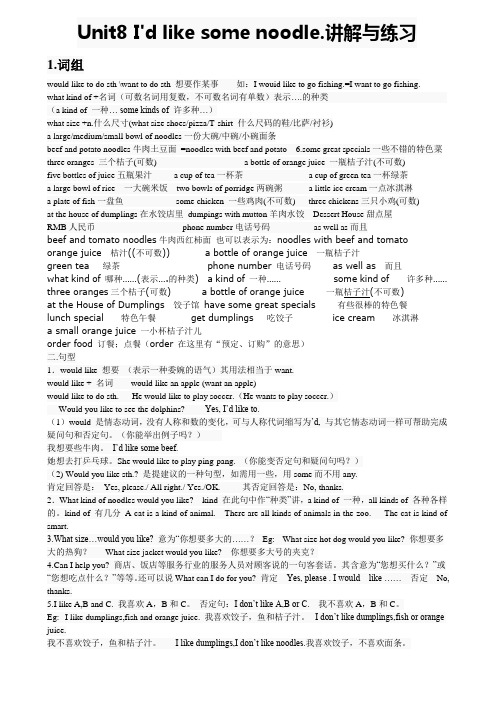
Unit8 I'd like some noodle.讲解与练习1.词组would like to do sth \want to do sth 想要作某事如:I wouid like to go fishing.=I want to go fishing.what kind of +名词(可数名词用复数,不可数名词有单数)表示….的种类(a kind of 一种… some kinds of 许多种…)what size +n.什么尺寸(what size shoes/pizza/T-shirt 什么尺码的鞋/比萨/衬衫)a large/medium/small bowl of noodles一份大碗/中碗/小碗面条beef and potato noodles牛肉土豆面=noodles with beef and potato 6.some great specials一些不错的特色菜three oranges 三个桔子(可数) a bottle of orange juice 一瓶桔子汁(不可数)five bottles of juice五瓶果汁 a cup of tea一杯茶 a cup of green tea一杯绿茶a large bowl of rice一大碗米饭two bowls of porridge两碗粥 a little ice cream一点冰淇淋a plate of fish一盘鱼some chicken 一些鸡肉(不可数) three chickens三只小鸡(可数)at the house of dumplings在水饺店里dumpings with mutton羊肉水饺Dessert House甜点屋RMB人民币phone number电话号码as well as而且beef and tomato noodles牛肉西红柿面也可以表示为:noodles with beef and tomatoorange juice 桔汁((不可数)) a bottle of orange juice 一瓶桔子汁green tea 绿茶phone number 电话号码as well as 而且what kind of 哪种……(表示….的种类) a kind of 一种…… some kind of 许多种……three oranges三个桔子(可数) a bottle of orange juice 一瓶桔子汁(不可数)at the House of Dumplings 饺子馆have some great specials 有些很棒的特色餐lunch special 特色午餐get dumplings 吃饺子ice cream 冰淇淋a small orange juice 一小杯桔子汁儿order food 订餐;点餐(order 在这里有“预定、订购”的意思)二.句型1.would like 想要(表示一种委婉的语气)其用法相当于want.would like + 名词would like an apple (want an apple)would like to do sth. He would like to play soccer.(He wants to play soccer.)----Would you like to see the dolphins? ----Yes, I’d like to.(1)would 是情态动词,没有人称和数的变化,可与人称代词缩写为’d, 与其它情态动词一样可帮助完成疑问句和否定句。
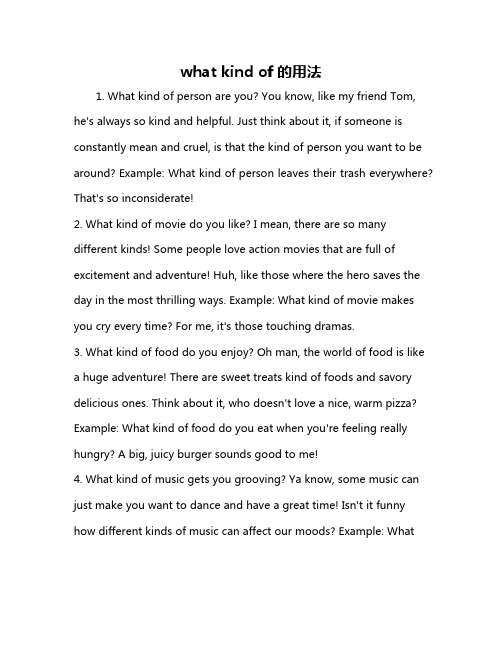
what kind of的用法1. What kind of person are you? You know, like my friend Tom, he's always so kind and helpful. Just think about it, if someone is constantly mean and cruel, is that the kind of person you want to be around? Example: What kind of person leaves their trash everywhere? That's so inconsiderate!2. What kind of movie do you like? I mean, there are so many different kinds! Some people love action movies that are full of excitement and adventure! Huh, like those where the hero saves the day in the most thrilling ways. Example: What kind of movie makes you cry every time? For me, it's those touching dramas.3. What kind of food do you enjoy? Oh man, the world of food is likea huge adventure! There are sweet treats kind of foods and savory delicious ones. Think about it, who doesn't love a nice, warm pizza? Example: What kind of food do you eat when you're feeling really hungry? A big, juicy burger sounds good to me!4. What kind of music gets you grooving? Ya know, some music can just make you want to dance and have a great time! Isn't it funny how different kinds of music can affect our moods? Example: Whatkind of music makes you feel happy and energetic? I love that upbeat pop.5. What kind of book do you love to read? There are so many genres out there! From fantasy worlds to real-life stories. Imagine getting lost in a book that's just so captivating. Example: What kind of book keeps you up all night reading? Those suspenseful ones sure do it for me!6. What kind of pet do you have or want? Pets are like our little companions! Some people love dogs for their loyalty and playfulness, while others prefer cats with their independence and grace. Example: What kind of pet is the most affectionate? I think dogs take the cake on that one!My conclusion: The "what kind of" usage helps us explore and understand different aspects of life, from people to things we enjoy. It makes us think about our preferences and the variety that exists in the world around us. It's a great way to have interesting conversations and discover more about ourselves and others.。
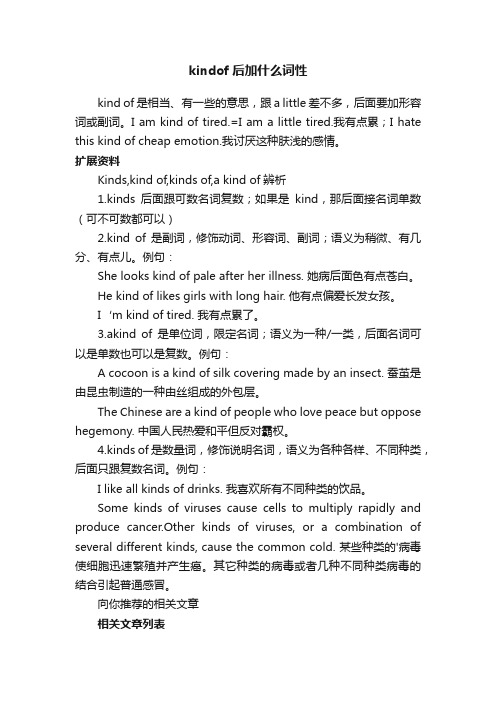
kindof后加什么词性kind of是相当、有一些的意思,跟a little差不多,后面要加形容词或副词。
I am kind of tired.=I am a little tired.我有点累;I hate this kind of cheap emotion.我讨厌这种肤浅的感情。
扩展资料Kinds,kind of,kinds of,a kind of辨析1.kinds后面跟可数名词复数;如果是kind,那后面接名词单数(可不可数都可以)2.kind of是副词,修饰动词、形容词、副词;语义为稍微、有几分、有点儿。
例句:She looks kind of pale after her illness. 她病后面色有点苍白。
He kind of likes girls with long hair. 他有点偏爱长发女孩。
I‘m kind of tired. 我有点累了。
3.akind of是单位词,限定名词;语义为一种/一类,后面名词可以是单数也可以是复数。
例句:A cocoon is a kind of silk covering made by an insect. 蚕茧是由昆虫制造的一种由丝组成的外包层。
The Chinese are a kind of people who love peace but oppose hegemony. 中国人民热爱和平但反对霸权。
4.kinds of是数量词,修饰说明名词,语义为各种各样、不同种类,后面只跟复数名词。
例句:I like all kinds of drinks. 我喜欢所有不同种类的饮品。
Some kinds of viruses cause cells to multiply rapidly and produce cancer.Other kinds of viruses, or a combination of several different kinds, cause the common cold. 某些种类的'病毒使细胞迅速繁殖并产生癌。
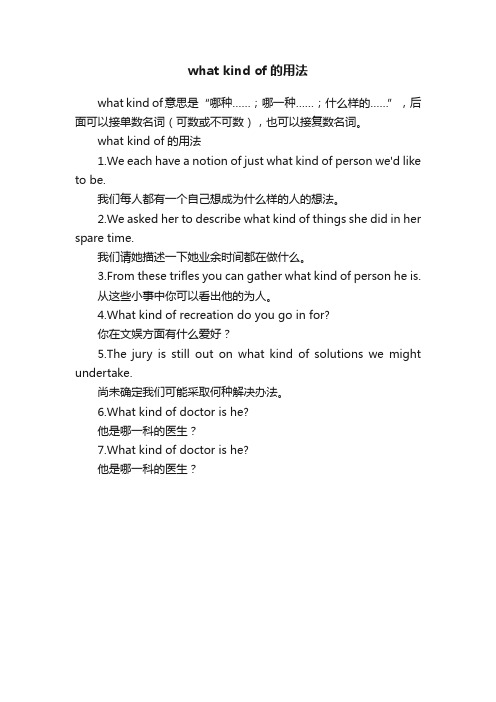
what kind of的用法
what kind of意思是“哪种……;哪一种……;什么样的……”,后面可以接单数名词(可数或不可数),也可以接复数名词。
what kind of的用法
1.We each have a notion of just what kind of person we'd like to be.
我们每人都有一个自己想成为什么样的人的想法。
2.We asked her to describe what kind of things she did in her spare time.
我们请她描述一下她业余时间都在做什么。
3.From these trifles you can gather what kind of person he is.
从这些小事中你可以看出他的为人。
4.What kind of recreation do you go in for?
你在文娱方面有什么爱好?
5.The jury is still out on what kind of solutions we might undertake.
尚未确定我们可能采取何种解决办法。
6.What kind of doctor is he?
他是哪一科的医生?
7.What kind of doctor is he?
他是哪一科的医生?。
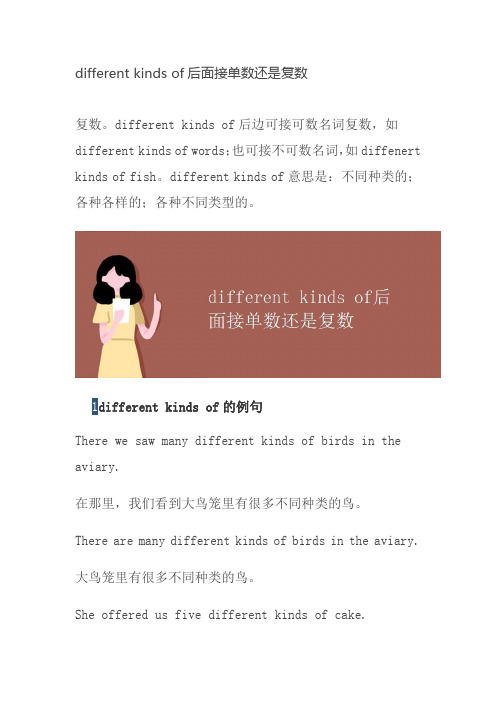
different kinds of后面接单数还是复数
复数。
different kinds of后边可接可数名词复数,如different kinds of words;也可接不可数名词,如diffenert kinds of fish。
different kinds of意思是:不同种类的;各种各样的;各种不同类型的。
1different kinds of的例句
There we saw many different kinds of birds in the aviary.
在那里,我们看到大鸟笼里有很多不同种类的鸟。
There are many different kinds of birds in the aviary. 大鸟笼里有很多不同种类的鸟。
She offered us five different kinds of cake.
她给我们提供了五种不同的蛋糕。
The soup was concocted from up to a dozen different kinds of fish.
这种汤是用多达十几种不同的鱼熬制而成的。
Within the umbrella term 'dementia' there are many different kinds of disease.
“痴呆”这一统称里包括多种不同的疾病。
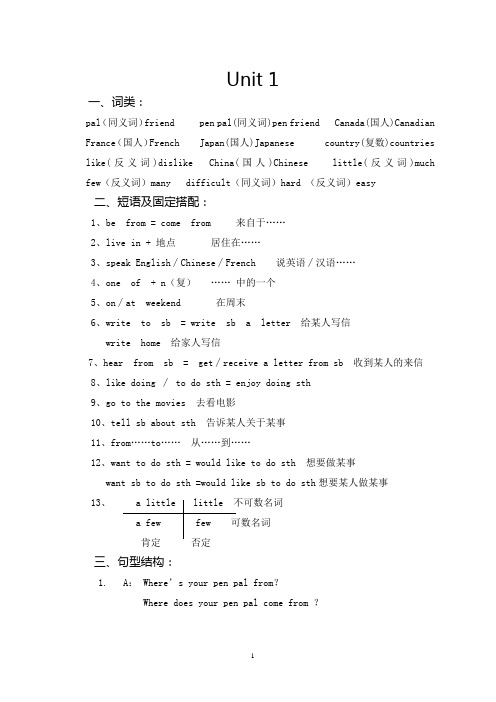
Unit 1一、词类:pal(同义词)friend pen pal(同义词)pen friend Canada(国人)CanadianFrance(国人)French Japan(国人)Japanese country(复数)countrieslike(反义词)dislike China(国人)Chinese little(反义词)much few(反义词)many difficult(同义词)hard (反义词)easy二、短语及固定搭配:1、be from = come from 来自于……2、live in + 地点居住在……3、speak English∕Chinese∕French 说英语∕汉语……4、one of + n(复)…… 中的一个5、on∕at weekend 在周末6、write to sb = write sb a letter 给某人写信write home 给家人写信7、hea r from sb = get∕receive a letter from sb收到某人的来信8、like doing ∕ to do sth = enjoy doing sth9、go to the movies 去看电影10、tell sb about sth 告诉某人关于某事11、from……to…… 从……到……12、want to do sth = would like to do sth 想要做某事want sb to do sth =would like sb to do sth想要某人做某事13、 a little little 不可数名词a few few 可数名词肯定否定三、句型结构:1. A:Where’s your pen pal from?Where does your pen pal come from ?B: He is from Australia2. A: what language do you speak?B: I speak Chinese .3. A: what is your favorite subject?B: My favorite subject is math.Math is my favorite subject.I like math best.4. I think it is interesting (否定)I don’t think it is interesting.Unit 2一、词性变换:1、library(复数)libraries2、there(反义词)here3、there(同音词)their4、behind(反义词)in front of5、after(反义词)before6、right(反义词)left∕wrong7、right (同音词)write 8、near(反义词)far9、down(反义词)up 10、open(反义词)close∕closed11、clean (反义词)dirty 12、noisy (反义词)quite(动名词)cleaning (名词) noise13、begin(动名)beginning 14、visit(名词)visitor15、fan(形容词)funny 16、hungry(反义词)full17、next to (同义词)beside 18、busy(反义词)free二、短语:1、 arrive in + 大地方at + 小地方 = get to = reach2、turn left ∕right 向左∕向右拐on the left∕right 左边∕右边、3、go straight 直走 go down∕along…沿着…走4、walk∕go across the bridge 平面穿过w alk∕go through the door 空间\内部穿过5、the beginning of… ……的开始6、take a taxi to …= go to…by taxi 去……乘出租车7、the way to …去……的路8、have fun doing sth 做某事很有趣9、in the neighborhood= near here 附近10、welcome to + 地点欢迎来到某地11、take ∕ have a walk12、a small hose with a garden13、A good place to do sth 一个做某事的地方14、come to visit +地点来参观某地15、have a good trip 旅途愉快16、in the park三、句型1、A: T hank you ∕ Thanks = Thank you very much = Thanks a lot B:You’re welcome = Not at all = That’s all right∕ ok2、have a good time = have fun = enjoy oneself3、 there is + 可数名词单数∕不可数名词Are + 可数名词复数have(has)Unit3一、词形转换zoo (复数)zoos box(复)boxes south(反)northugly(反)beautiful meat(同音)meet leaf(复)leavesclever(同义)smart relax(形)relaxed ∕ relaxingfriend(形)friendly二、短语1、please be quite 请安静2、play with sb 和某人一起玩3、be friendly ∕ nice ∕ good ∕ kind to sb 对某人友好4、get up 起床5、let sb do sth 让某人做某事6、kind of ∕a little ∕a bit + 形有点……7、all kinds of + 名词复数各种类型的……a kind of +名词单∕复数一种类型的……8、during ∕in the day (反) at night9、one …… the other …… (两者中的)一个……另一个10、what other + 名词复数其他的……11、be different from …… 与……不同t he same as …… 与……相同sb 害怕某人12、be afraid ∕ scared of sth 害怕某物doing sth 害怕去做某事13、South Africa 南非三、语法1、and肯定句中表并列,or否定句中表并列but表转折; or 表选择; So 表因果2、too 用于肯定句末;also用于肯定句中(系动词、情态动词之后、实义动词之前);either用于否定句末。
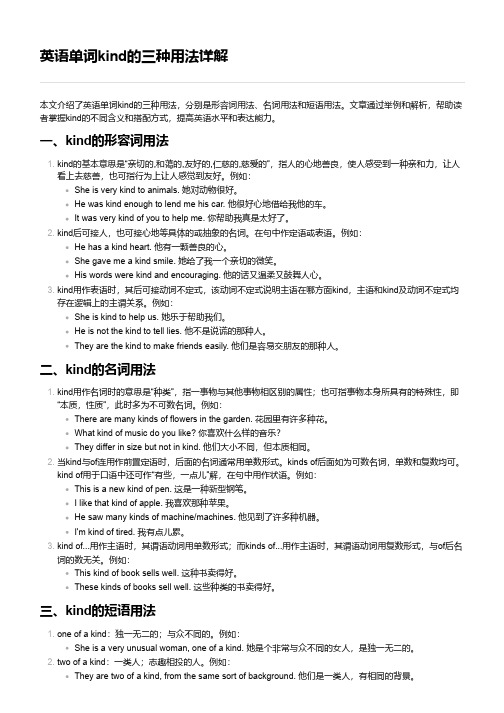
英语单词kind的三种用法详解本文介绍了英语单词kind的三种用法,分别是形容词用法、名词用法和短语用法。
文章通过举例和解析,帮助读者掌握kind的不同含义和搭配方式,提高英语水平和表达能力。
一、kind的形容词用法1. kind的基本意思是“亲切的,和蔼的,友好的,仁慈的,慈爱的”,指人的心地善良,使人感受到一种亲和力,让人看上去慈善,也可指行为上让人感觉到友好。
例如:She is very kind to animals. 她对动物很好。
He was kind enough to lend me his car. 他很好心地借给我他的车。
It was very kind of you to help me. 你帮助我真是太好了。
2. kind后可接人,也可接心地等具体的或抽象的名词。
在句中作定语或表语。
例如:He has a kind heart. 他有一颗善良的心。
She gave me a kind smile. 她给了我一个亲切的微笑。
His words were kind and encouraging. 他的话又温柔又鼓舞人心。
3. kind用作表语时,其后可接动词不定式,该动词不定式说明主语在哪方面kind,主语和kind及动词不定式均存在逻辑上的主谓关系。
例如:She is kind to help us. 她乐于帮助我们。
He is not the kind to tell lies. 他不是说谎的那种人。
They are the kind to make friends easily. 他们是容易交朋友的那种人。
二、kind的名词用法1. kind用作名词时的意思是“种类”,指一事物与其他事物相区别的属性;也可指事物本身所具有的特殊性,即“本质,性质”,此时多为不可数名词。
例如:There are many kinds of flowers in the garden. 花园里有许多种花。
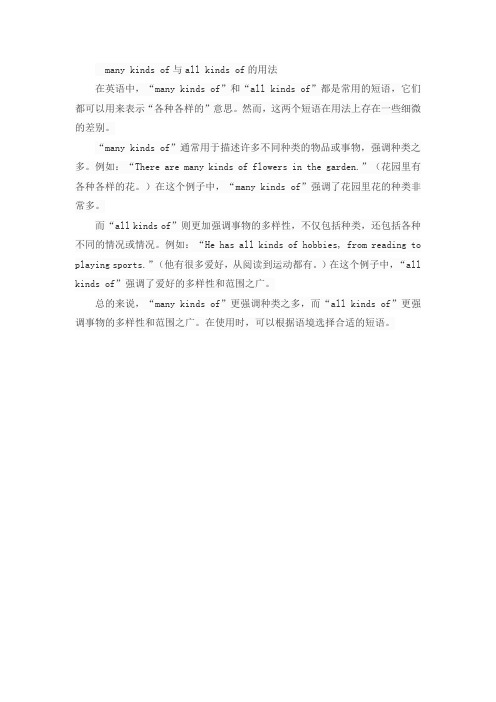
many kinds of与all kinds of的用法
在英语中,“many kinds of”和“all kinds of”都是常用的短语,它们都可以用来表示“各种各样的”意思。
然而,这两个短语在用法上存在一些细微的差别。
“many kinds of”通常用于描述许多不同种类的物品或事物,强调种类之多。
例如:“There are many kinds of flowers in the garden.”(花园里有各种各样的花。
)在这个例子中,“many kinds of”强调了花园里花的种类非常多。
而“all kinds of”则更加强调事物的多样性,不仅包括种类,还包括各种不同的情况或情况。
例如:“He has all kinds of hobbies, from reading to playing sports.”(他有很多爱好,从阅读到运动都有。
)在这个例子中,“all kinds of”强调了爱好的多样性和范围之广。
总的来说,“many kinds of”更强调种类之多,而“all kinds of”更强调事物的多样性和范围之广。
在使用时,可以根据语境选择合适的短语。

many kinds of与all kinds of的用法-回复关于"many kinds of"和"all kinds of"的用法,首先我们可以从它们的概念和构成入手。
"Many kinds of"和"all kinds of"都是用来描述多样性和多样性的表达方式。
它们通常用于修饰名词,表示某种事物具有很多不同类型或种类。
首先,让我们来看一下"many kinds of"的用法。
这个短语指的是一件事物有许多不同类型或种类。
在这种情况下,"many"是形容词,修饰名词"kind",表示有很多种类。
例如:1. There are many kinds of flowers in the garden.(花园里有很多种类的花。
)2. The store offers many kinds of bread.(这家商店提供很多种类的面包。
)3. She has read many kinds of books.(她读过很多种类的书。
)在这些例句中,"many kinds of"都用来表示各种不同的类型或种类,强调了多样性和丰富性。
接下来,让我们来看一下"all kinds of"的用法。
这个短语指的是一件事物包含或涵盖了各种类型或种类。
在这种情况下,"all"是一个限定词,修饰名词"kinds",表示包括了所有类型。
例如:1. The supermarket sells all kinds of fruits and vegetables.(超市销售各种水果和蔬菜。
)2. The museum has all kinds of historical artifacts.(博物馆藏有各种历史文物。
◆what kind of加可数名词单数或不可数名词,what kinds of后加名词复数。
◆以前就喜欢用like doing当表示想要,欲做某事用like to do
◆hear of,只能用于一般疑问句和否定句=hear about(heard),Hear后面加sth/sb =hear from sb.收到...的
来信
◆too much+不可数名词much too太...+adj too many+可复
◆all kinds of+可复
◆感叹句注意断句,名词用what,副词形容词用how
◆Not only后倒装but also后陈述
◆Make sb do sth变make sb to do sth(被动语态中)
◆位于,平躺lie--lay--lain 说谎lie--lied--lied 放置,下蛋lay--laid--laid
◆On表示在农场,路边或左(右)边
◆Except for表示对整体肯定,对细节修正
◆By+单数
◆Use out of用光(人)=use out(物)
◆Find oneself发现自己在某个地方或处于某种状态
◆Prevent/stop sb from doing sth(from可省)keep sb from doing sth(from不可省)
◆The+n一类人谓语动词用复数
◆Across平面穿过through空间穿过
◆Women/men teachers boy/girl students
◆experience经历(可数)经验(不可数)
◆While+延续性动词when+短暂性动词
◆数词+more+可复=another+数词
◆The first/last sb to do sth
◆Open(v,adj)close(v)closed(adj)
◆When+过去式句子=by the time(用过去完成时)
◆虚拟语气无论主语是什么都用were
◆当要表达和说明人或物的状态时,感官动词后面就用形容词,当要修饰动词时,感官动词后用副词◆cheer欢呼study不可数名词plant-planted-planted weigh(v)weight(n)
◆Keep on doing sth表示动作的反复keep doing sth表动作的连续
◆feed on以...为食;feed sb/sth on/with sth用...喂....;feed to+对象,喂入
◆Neither...nor...就近原则
◆On the one hand;on the other hand
◆No longer=not any longer修饰延续性动词;no more=not any more修饰非延续性动词
◆One .....the other......(两个中)一个.....另一个。
前面提到具体数词,
Some.....others....一些.....另一些...后面再说剩下的,
Any other+单数名词其他任何一个,一般用the other+复述名词或the others
Another+可数名词单数
◆感官动词+do表示动作的完整性,真实性;+doing 表示动作的连续性,进行性
I saw him work in the garden yesterday.
昨天我看见他在花园里干活了.(强调"我看见了"这个事实)
I saw him working in the garden yesterday.昨天我见他正在花园里干活(强调"我见他正干活"这个动作)
典型例题
1)They knew her very well.They had seen her ___ up from childhood.
A.grow
B.grew
C.was growing
D.to grow
答案:A.他们看着她长大,因此强调的是成长的过程, 而非正在长的动作,因此用see sb do sth 的句型.
2)The boy was seen ___ near the river.
A.playing
B.to be playing
C.play
D.to play
答案:A.本题强调其动作,正在河边玩,应此用see sb.doing sth句型.
,。